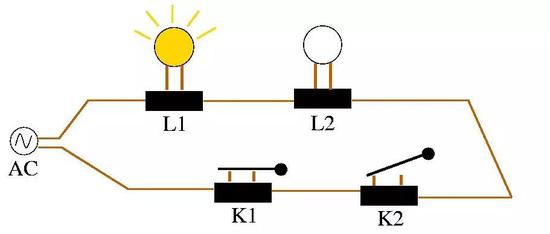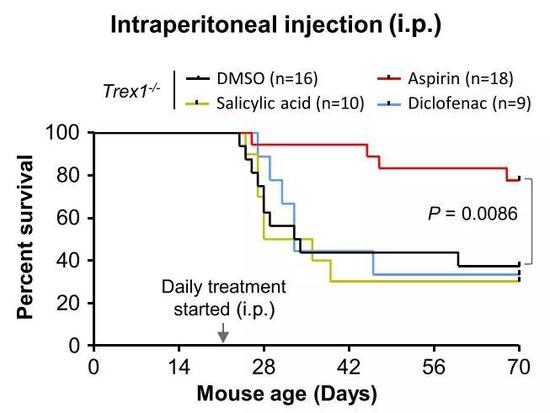Chinese scientists discover that aspirin acts on interferon signaling pathway February 25, 2019 Source: Singularity Network Since its birth, aspirin has been through more than 120 years. Different from the important findings of many unexpected surprises, the goals of Dr. Li Tao and Academician Zhang Xuemin at the beginning were very clear, aiming at the star channel of cGAS-STING. Because it has been found to be closely related to many diseases, especially autoimmune diseases. Human cells must always guard against the invasion of viruses. Many times, the virus injects its own DNA into the cytoplasm of the host to achieve the purpose of infection. Therefore, the identification of viral DNA in the cytoplasm is a key link in the immune virus [2]. However, the recognition of cytoplasmic DNA by the cGAS-STING pathway is not very specific. DNA from the cell itself, if present in the cytoplasm, also triggers an immune response. Congenital genetic mutations are difficult to compensate. However, the ultimate occurrence of these diseases requires all links to be smooth. Just like a series circuit, as long as we cut off a node in the middle of the circuit, the entire circuit is powered off. We know that the function of proteins is also affected by chemical modifications. For example, familiar phosphorylation (that is, adding a phosphate group to a protein), and acetylation (adding an acetyl group to a protein). These chemical modifications are like putting a switch on the protein that controls the function (activity, stability or localization) of the protein. This study, from in vitro to in vivo, from human cells to animal models, is very clear that acetylation is the switch that controls the cGAS-STING pathway. By acetylation of aspirin, the cGAS-STING pathway can be blocked and autoimmune diseases can be inhibited. YT-H706 YT-H706 Shenzhen Sunshine Technology Co.,Ltd , https://www.yatwin.com
From the initial antipyretic and analgesic anti-inflammatory drugs, to the discovery of anticoagulant and cardiovascular disease prevention. Subsequently, it was proved to have a preventive function against cancers that people smell.
Not long ago, we also reported that scientists at the Chinese University of Hong Kong found in the 600,000 Chinese cohort that taking aspirin is associated with a reduced incidence of multiple cancers, especially liver cancer and gastric cancer.
Nowadays, Chinese scientists have continued to write new legends for the centuries-old medicine of aspirin.
Recently, Dr. Li Tao and Academician Zhang Xuemin of the Chinese Academy of Military Medical Sciences confirmed in human cells and mouse models that aspirin blocks an important immune pathway through its housekeeping ability, acetylation (cGAS-STING pathway). Activation of the interferon response, which may be possible to treat autoimmune diseases (eg, lupus erythematosus, Aikadi syndrome). Related research was published in the top academic journal Cell [1]. 
Left: Dr. Li Tao Right: Academician Zhang Xuemin
In 2013, Professor Chen Zhijian, a famous Chinese scientist, discovered that the recognition and mediation of DNA in the cytoplasm was done by the cGAS-STING pathway. After recognition, the cGAS-STING pathway activates the interferon response, triggering innate immunity to protect against the virus [3]. This discovery set off a wave of research on the cGAS-STING pathway. 
Professor Chen Zhijian
For example, human genomes incorporate retroviral DNA, which also produces cytoplasmic DNA; in addition, cytoplasmic DNA is also produced after cell damage. These self-derived DNA also activate the interferon response through the cGAS-STING pathway [4]. In other words, each cell can trigger an autoimmune response, which is a big problem.
In fact, don't worry, if there is such a problem, how can humans live to the present? The human body has evolved a mechanism to eliminate endogenous cytoplasmic DNA to prevent autoimmune diseases.
However, this set of removal mechanisms can also be problematic. Scientists have discovered it before. In patients with lupus erythematosus and Ekadi syndrome, the cytoplasmic DNA degrading enzyme gene is mutated, causing a large accumulation of DNA in the cytoplasm, which causes the cGAS-STING pathway to be activated for a long time, triggering a systemic autoimmune response [5] ]. 
Edika syndrome occurs mostly in children and can damage nerves. 
The cGAS-STING path is such a node, and it also has a switch. The cGAS-STING path is such a node, and it also has a switch.
This time, Li Tao and Zhang Xuemin's team found through analysis that a core member of the cGAS-STING pathway, the cGAS protein, has an acetylation modification. This acetyl group is probably a switch in the cGAS-STING pathway.
However, what role does this switch play? The researchers conducted an in-depth exploration.
Through several experiments, they found that enhancing the acetylation of cGAS protein can inhibit the cGAS-STING pathway and thereby suppress the immune response. In other words, acetylation is indeed the switch that controls the cGAS-STING path. 
Acetylation can control the functional acetylation of cGAS protein to control the function of cGAS protein
We know that aspirin (acetylsalicylic acid) is the best way to acetylate proteins!
Can that aspirin achieve the goal we want? The answer is yes.
The researchers first demonstrated in vitro that aspirin can acetylate cGAS protein and inhibit its activity. In peripheral blood mononuclear cells derived from patients with Aikadi syndrome, aspirin can inhibit cGAS protein and inhibit the cGAS-STING pathway in the presence of a large amount of DNA in the cytoplasm.
Subsequently, model mice with autoimmune diseases were treated with aspirin, and it was found that aspirin can acetylate cGAS protein in animals and inhibit interferon response, thereby treating autoimmune diseases in mice. 
Aspirin can treat autoimmune diseases in mice. Aspirin can treat autoimmune diseases in mice.
At present, we have no effective treatment for these autoimmune diseases. Aspirin is a widely used and inexpensive drug. Therefore, the research is not only "top of the sky" (exploring the frontier unknown areas) but also "site" (with practical application value), and the significance is extraordinary.
Of course, while singing the aspirin, let us not forget that there are also many limitations.
In July 2018, The Lancet reported that low-dose aspirin had a protective effect on cardiovascular disease depending on body weight. In August 2018, The Lancet and the New England Journal of Medicine reported separately that there is little benefit in using aspirin to prevent cardiovascular disease in middle-aged and elderly people with moderate cardiovascular risk and diabetes.
Therefore, do not expect to have a panacea for all diseases. For any drug, you should seek truth from facts, be clear about the conditions of use, and follow the doctor's advice.
Finally, for the findings of this study, whether aspirin can really be effective for patients with autoimmune diseases, and how effective it is, depends on the results of clinical trials. Let us hope that Chinese scientists will continue to bring surprises!